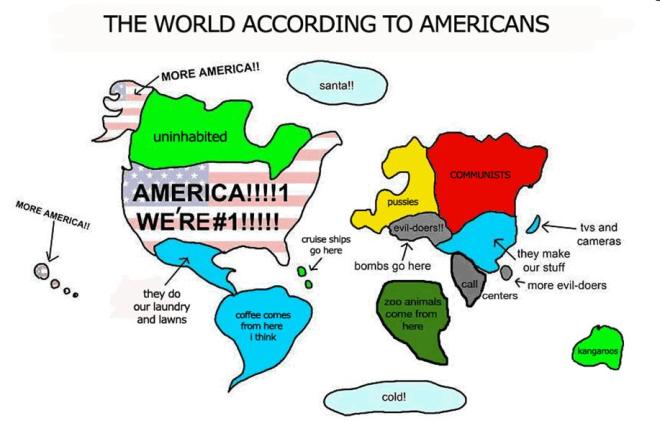There are a lot of Americans with whom I can’t talk politics. I’m related to many of them. Some of them, it’s just not worth the trouble to start a conversation that is mostly going to be a demonstration of how their values are the exact opposite of mine. But there’s a specific flavor of American that I find especially infuriating, a snowflake so special it would deny its kinship with water and steam and start fistfights over the idea that it could melt, and they disturb me so much that, if I ever stop calling myself an American, it will be because of them.

Elections are a truly bizarre spectacle in these circles. As soon as any conversation turns toward the possibility that a candidate might actually change things, the standard refrains come out: “That will never work in America.” “That’s not the American way.” “That’s not how we do things here.” And if the idea is at all oriented toward social justice or, even worse, based on something that worked somewhere else, one doesn’t even get to finish proposing it before the catchphrases flow: “Well if you hate America so much, Cuba is 90 miles that way. Better start now; it’s a hell of a swim.” Whatever the idea being discussed is, it’s now been declared outside the American tradition and therefore not to be contemplated except as a perversion unique to foreigners and spies.
That’s the premise of the PFAQL. The United States is the best thing in the universe, so whatever the US is doing is automatically the best version of that thing, and other versions fail because they’re not that version. Ergo, if Norway manages overwhelmingly lower income inequality and Canada has overwhelmingly better healthcare outcomes, that means that higher income inequality and worse healthcare outcomes are good things, because if they weren’t, the US wouldn’t be doing them. There’s always some weird consequence or downstream effect the PFAQL can imagine that is, to their minds, the reason why France’s culinary supremacy or South Africa’s progressive constitution is secretly a horrible thing, and that they’d be way better off if they instead did things exactly the way the US does. Most of them ultimately boil down to, “The US is the world’s economic powerhouse, so everything else is irrelevant.”
These are people who do not have an easy way to comprehend the empirical reality of the US’s status on the world stage. We call ourselves “the greatest country in the world,” but what makes us great?

Not our press freedom.
When one takes a hard look at the actual numbers, one sees that the US is the “greatest” on only a handful of metrics.
We’re #1 for sexually-transmitted infections per capita in the industrialized world.
We’re #1 for citizens that think angels are real.
On good things, on things that a country should be proud to be #1 at…we come up woefully short.
But don’t tell the flag-fondler that. Even if you can get them to concede that some other country does a thing better than the US does—if they’ve traveled, maybe, and they’ve seen that the public transit system in Bogotá vastly surpasses almost any in the United States, or that even Saudi Arabia has figured out the virtues of socialized medicine—they’ll come up with some special thing about the US to suggest that this ingenious plan would fail if it were transplanted. There’s just some thing about the United States that makes things that work elsewhere fail here, because we’re the greatest country in the world, you see, and that takes uniqueness.
The fact that lots of US ideas are transplants from elsewhere, including our common law system, our primary languages, and our vaunted democracy itself, is of course irrelevant…somehow.
If this all sounds familiar, that’s because I already wrote this commentary once before. The first time, though, it was about how religion poisons one’s moral intuitions to declare good things that, in any other framework, would be monstrous. This applies to politics, too, where the PFAQL’s definitional refusal to grapple with the facts of the world as they are means that they have to find excuses for the US’s shortcomings.
It’s pointless to reinvent the wheel. Israel has better airport security. Australia has better gun laws. Canada has a better healthcare system. Finland has better K-12 education. France figured out socialized universities. Almost every country that ever bothered with the silly and cumbersome imperial measurement system has abandoned it for metric. These are all lessons that the United States would be wise to learn. The US will necessarily and inevitably put its own spin on all of these ideas, a spin based on the US’s impressive geographic spread, population, role in international affairs, and individualistic tendencies. And that’s as it should be. Every country’s experience is ultimately its own, and the general principles that lead to the best results must ultimately answer to the reality of what works for actual people.
Unfortunately for the PFAQL, what works for actual people is always, always information, and if they were prepared to deal with that, they would not be insisting that the US has nothing to gain from looking at how other countries do things and seizing upon everything that looks useful. That has been the United States’s modus operandi for growing its population since before there was a United States—how’s that for “how we do things here?”
Because that’s what patriotism means: wanting your country to be the best it could possibly be and trying to make it so, not assuming it is and trying to freeze it in place. When there is so much improving left to do, so much more greatness that could be ours, it is downright treasonous to suggest staying put.

